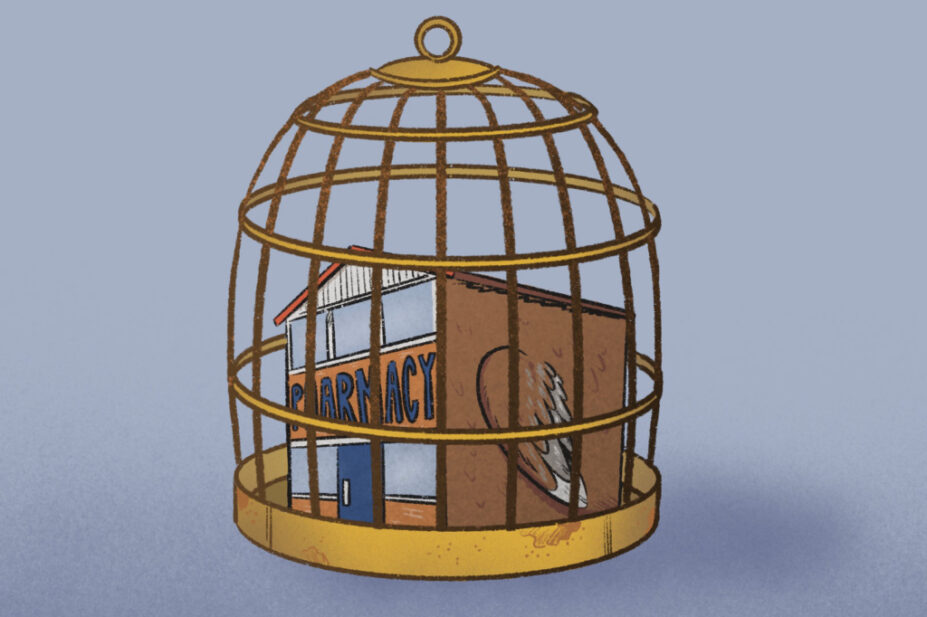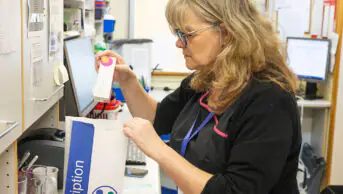
Wes Mountain/The Pharmaceutical Journal
Community pharmacies have the potential to become ‘health and wellbeing hubs’, enabling people and communities to stay healthy and well, with a particular focus on reducing health inequalities.
We know that community pharmacies already provide vital services to local populations. The ‘2022 Pharmacy Audit’, published by Community Pharmacy England (CPE) in June 2022, estimated that an average of 866,000 consultations are carried out by pharmacists to respond to patients’ symptoms each week in England, while a further 20% seek advice about existing medical conditions[1]. Data cited within the audit report estimates that were pharmacies not there, it would result in approximately 619,000 additional GP appointments each week, or 95 appointments in each GP practice each week in England.
It is clear that community pharmacies are a valuable resource for patients, but every piece of pharmacy work is currently accompanied by quantifiable target driven criteria, meaning we are losing sight of the enhanced — and uncommissioned — benefits that community pharmacies currently provide.
When the direction of travel in the wider health and care sector is towards systemwide working and ‘Making every contact count’, whereby every interaction between patients and a healthcare professional should be an opportunity to support individuals in making positive changes to their physical and mental health and wellbeing, what we need is a better way forward that aligns with CPE’s ‘Vision for community pharmacy’, published in September 2023[2–4].
CPE’s report identifies four dimensions to the future community pharmacy: preventing ill-health and supporting wellbeing; an integrated primary care offer for neighbourhoods; providing clinical care for patients; and living well with medicines. We welcome this clear vision that resonates with grassroots developments in pharmacies in Lincolnshire.
The vision particularly resonated with our ‘Lifeguard pharmacy’ pilot, a new mental health service that fits with the agenda to “prevent ill-health and support well-being”. Funding to take part in the pilot was not tied to the number of patient contacts, unlike many NHS services commissioned from community pharmacies. Early results are indicating that this new approach can really make an impact on patients.
Lifeguard pharmacies
‘Lifeguard pharmacy’ was piloted in eight Lincolnshire Coop pharmacies from January to July 2023 and has been evaluated by the research team who are now in discussions with the local county council and integrated care system about developing a commissioned service. Building on the foundations of the ‘Ask for ANI’ domestic abuse support intervention during the COVID-19 pandemic, the ‘Lifeguard pharmacy’ project started off as a domestic abuse and suicidal ideation support project but is showing signs of growing to be of greater value than initially realised. The service was co-developed with input from various lay members, including people with lived experience of domestic abuse and suicide ideation, as well as representatives from support organisations and professionals working across the health system in Lincolnshire.
Each participating pharmacy trained several ‘lifeguards’ among their staff so that sufficient daily coverage is available in the pharmacy to provide structured signposting support for those experiencing suicidal ideation or domestic abuse. The lifeguard model is different in that it is person-centred rather that process or product-centred. Following training, the staff and premises were accredited to provide gold standard, wrap-around support for patients. Lifeguards were trained to provide a full consultation to individuals rather than just signposting patients through sharing of contact information alone. Depending on the level of alert — ‘assistance required’, ‘action required’ or ‘alert emergency services’ — the lifeguard assists the individual to access support via the most appropriate route.
Lifeguards in pharmacy provides an ideal opportunity to ‘make every contact count’
Other quality criteria were put in place, such as minimum staffing levels to ensure availability of a lifeguard in store at all times; a chaperone policy; enhanced requirements for supervised consumption, whereby individuals cannot be accompanied by partners or friends for supervised consumption visits (to give an opportunity to raise the alarm about an abusive partner for example); and greater discretion when prescriptions are handed out.
‘Lifeguard pharmacies’ were paid a flat fee to cover their expenses as part of the pilot, to ensure appropriately trained staff are in the pharmacy at all times to maintain a quality service provision. Pharmacies are not paid per item. This fee is currently in development ahead of further roll out as a service fee would need to account for all ongoing costs and be acceptable to pharmacies from a wider range of organisations.
The pilot was externally accredited and monitored by the University of Lincoln, working to quality criteria, with links as a trusted provider connected to other organisations and referral pathways — an integrated, holistic service aimed to providing a gold standard for mental health and social issues support.
The five key referral organisations include local mental health crisis cafes, Lincolnshire NHS Crisis Team for Suicide Prevention, the local domestic abuse service, local GP surgeries and the local substance misuse service. The positive feedback from customers gathered as part of the pilot evaluation confirmed that accreditation of being a ‘lifeguard pharmacy’ has become a marker of quality and trustworthiness. The feedback noted patient confidence in the abilities of the specifically and appropriately trained staff in these pharmacies to offer an effective and professional service and believed that pharmacies are easy to access for people in danger compared with other healthcare services.
Making every contact count
Lifeguards in pharmacy provides an ideal opportunity to ‘make every contact count’[3]. As a result of the training they received as part of the project, ‘lifeguards’ are better able to talk to patients about wider areas of their lives and offer assistance. So rather than being the solely patient-initiated support as was initially envisaged, this is staff-initiated support that would arguably not have happened without the lifeguard training or the availability of staff with capacity in the pharmacy.
Commissioning a local hub-based service in this way could present unique opportunities to reduce health inequalities, catch those in crisis and unlock potential long-term savings
Trained staff provided feedback saying that they now “plainly see what was hidden in plain sight“, being able to identify safeguarding issues in their regular customers that they were previously oblivious to, using the directory of relevant support services in their local area on easy-to-use cards provided, along with discreet cards for clients that contain QR codes to take them directly to the relevant project website support page. Providing the means of onward referral and staff training has empowered pharmacy staff to step out of their comfort zone and engage in sensitive conversations that could save lives.
Realising the ‘health and wellbeing hub’ vision
The pilot pharmacies were given payments to cover their expenses to take part in the project, which were not linked in any way to number of contacts. The commissioning of a service in this way on a county-led basis, with oversight from appropriately qualified and skilled individuals, is a small step towards truly integrated healthcare.
Commissioning a local hub-based service in this way, much like the mental health support cafes that have been commissioned within Lincolnshire as part of wider system support, could present unique opportunities to reduce health inequalities, catch those in crisis before things gets too bad and unlock the potential long-term savings that result from both avoiding domestic abuse and suicide attempts and providing good mental health support.
Using data from 2017, the estimated annual cost to the NHS for a single victim of domestic abuse was estimated at £34,015[4]. This is equivalent to £42,088 in 2023, with an overall England and Wales equivalent cost in February 2023 of £81.7bn. The average cost of a single suicide in England has been estimated at up to £1.7m[5].
Pharmacies are there to dispense medications and advise patients on their use, but they offer a wider benefit. As CPE’s ‘Vision for community pharmacy’ recognises, increased investment from commissioners to reflect the increased significance of community pharmacy in the health care ecosystem is necessary. This should include considering new ways of commissioning. Focusing solely on box-ticking and counting services as items is counterproductive.
In 1978, Max Weber argued that this kind of rationalisation leaves organisations trapped in an “iron cage of bureaucracy”, which stifles innovation[6]. Only by escaping this iron cage can pharmacies provide most benefit to population health and wellbeing and, in turn, offer maximum support within the health system, reducing costs and health inequalities and improving patient outcomes.
Community-based bricks and mortar pharmacies have the potential to be at the heart of community health and wellbeing. It is now time for commissioners to look to invest to provide a holistic service to patients for the wider benefit of society.
- 1PSNC Pharmacy Advice Audit. Community Pharmacy England. 2020. https://psnc.org.uk/quality-and-regulations/clinical-governance/clinical-audit/psnc-pharmacy-advice-audit (accessed December 2023)
- 2Baird B, Buckingham H, Charles A, et al. A vision for community pharmacy. Nuffield Trust. 2023. https://www.nuffieldtrust.org.uk/sites/default/files/2023-09/Nuffield%20Trust%20and%20The%20King%27s%20Fund%20-%20A%20vision%20for%20community%20pharmacy_WEB_FINAL.pdf (accessed December 2023)
- 3Making Every Contact Count. NHS England. 2023. https://www.e-lfh.org.uk/programmes/making-every-contact-count (accessed December 2023)
- 4The economic and social costs of domestic abuse. Home Office. 2019. https://www.gov.uk/government/publications/the-economic-and-social-costs-of-domestic-abuse (accessed December 2023)
- 5Knapp M, McDaid D, Parsonage M. Mental health promotion and mental illness prevention: The economic case. UK government Department of Health. 2011. https://assets.publishing.service.gov.uk/media/5a7bad75ed915d1311060cb2/dh_126386.pdf (accessed December 2023)
- 6Weber M. Economy and Society: An Outline of Interpretive Sociology. California: University of California Press 1978.


